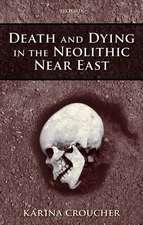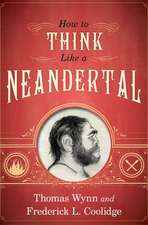Monumentality in Later Prehistory: Building and Rebuilding Castell Henllys Hillfort
Autor Harold Mytumen Limba Engleză Paperback – 23 aug 2016
| Toate formatele și edițiile | Preț | Express |
|---|---|---|
| Paperback (1) | 647.40 lei 6-8 săpt. | |
| Springer – 23 aug 2016 | 647.40 lei 6-8 săpt. | |
| Hardback (1) | 654.12 lei 6-8 săpt. | |
| Springer – 17 aug 2013 | 654.12 lei 6-8 săpt. |
Preț: 647.40 lei
Preț vechi: 761.65 lei
-15% Nou
Puncte Express: 971
Preț estimativ în valută:
123.87€ • 129.35$ • 102.29£
123.87€ • 129.35$ • 102.29£
Carte tipărită la comandă
Livrare economică 15-29 aprilie
Preluare comenzi: 021 569.72.76
Specificații
ISBN-13: 9781493947867
ISBN-10: 1493947869
Pagini: 350
Ilustrații: XIV, 336 p. 141 illus., 87 illus. in color.
Dimensiuni: 178 x 254 x 19 mm
Greutate: 0.61 kg
Ediția:Softcover reprint of the original 1st ed. 2013
Editura: Springer
Colecția Springer
Locul publicării:New York, NY, United States
ISBN-10: 1493947869
Pagini: 350
Ilustrații: XIV, 336 p. 141 illus., 87 illus. in color.
Dimensiuni: 178 x 254 x 19 mm
Greutate: 0.61 kg
Ediția:Softcover reprint of the original 1st ed. 2013
Editura: Springer
Colecția Springer
Locul publicării:New York, NY, United States
Cuprins
Chapter 1- Enclosure and Monumentality: Hillforts in British and European Late Prehistory.- Chapter 2- Castell Henllys in its Temporal, Cultural and Intellectual Contexts.- Chapter 3 – The Palisade and Entrance.- Chapter 4- The Interior: Roundhouses, Scoops and Activity Areas.- Chapter 5- A Boundary In Stones: The Chevaux-De-Frise.- Chapter 6- The Palisaded Settlement: Its Size, Character and Environmental Impact.- Chapter 7- Previous Research on Hillfort Ramparts and Ditches.- Chapter 8- Ramparts and Ditches on the Western Side of the Fort.- Chapter 9- The Building of a Rampart: Stratigraphy and Action Unpicked.- Chapter 10- Encircling the Promontory.- Chapter 11-Ramparts and Ditches: Evidence and Inference.- Chapter 12- Crossing Thresholds: Entrances in Stone.- Chapter 13- Crossing Thresholds: From Monumental to Non-Monumental.- Chapter14- An Epilogue: The Late Roman or post-Roman refurbishment.- Chapter 15- Context, Function, Meaning.
Notă biografică
Harold Mytum MA (Cambridge) DPhil (Oxford) FSA is Director of the Centre for Manx Studies and Professor of Archaeology at the University of Liverpool. His fieldwork at Castell Henllys and other regional sites has continued over 30 years, partly within a field school training context (Global Perspectives on Archaeological Field Schools. Constructions of knowledge and experience. New York: Springer, 2012). He has written numerous articles and book chapters on reconstruction and public interpretation at Castell Henllys, and a monograph, journal articles, and book chapters on the later prehistory of the region (Williams and Mytum Llawhaden, Dyfed: Excavations on a group of small defended enclosures, 1980-4. Oxford: Tempus Reparatum, 1994). Harold is also well known for his historical archaeology research (Recording and Analysing Graveyards. Council for British Archaeology Handbook 15. York: Council for British Archaeology, 2000; Mortuary Monuments and Burial Grounds of the Historic Period. New York: Kluwer Academic/Plenum, 2004; Carr and Mytum eds Cultural Heritage and Prisoners of War: Creativity Behind Barbed Wire. New York: Routledge, 2012; Mytum and Carr eds Prisoners of War: archaeology, memory and heritage of 19th- and 20th-century mass internment. New York: Springer, 2013).
Textul de pe ultima copertă
This volume provides the results of a 30-year excavation, reconstruction, and public interpretation campaign at the late prehistoric inland promontory settlement of Castell Henllys, here focusing on the defensive sequence and the role of monumentality in later prehistory. The site has international significance because of the extensive excavations of the Iron Age palisaded settlement and later earthen ramparts, complex gateway, and chevaux-de-frise of upright stones. It is now widely recognised that the Iron Age consisted of many regional cultural traditions, and the excavations at Castell Henllys provide a vital contrast to the well-known large hillfort communities in other parts of England and Wales as well as across Europe. As such, it is a unique window into a widespread but largely ignored site category and form of social and economic organisation. The publication will provide a case study for the construction and use of the earthworks of a major European late prehistoric settlement type – the Iron Age hillfort; the monumental construction is compared with other communal investments such as the Mississippian mounds. It will also offer an innovative form of site reporting, including alternative interpretations of the earthworks as either military defences or the community-binding symbols. Along with Excavation, Experiment, and Heritage Interpretation: Castell Henllys Hillfort Then and Now, these books will be required reading by those studying the late prehistoric archaeology of Britain and Europe at advanced undergraduate and postgraduate level, and by those in North America studying complex societies, monumentality, and ways of writing archaeology.
Caracteristici
Presents one of the most extensively excavated hillfort defences in Britain and Europe Considers the social and environmental implications of hillfort construction in a comparative framework Provides careful consideration of changing roles of heritage in cultural politics Includes supplementary material: sn.pub/extras








